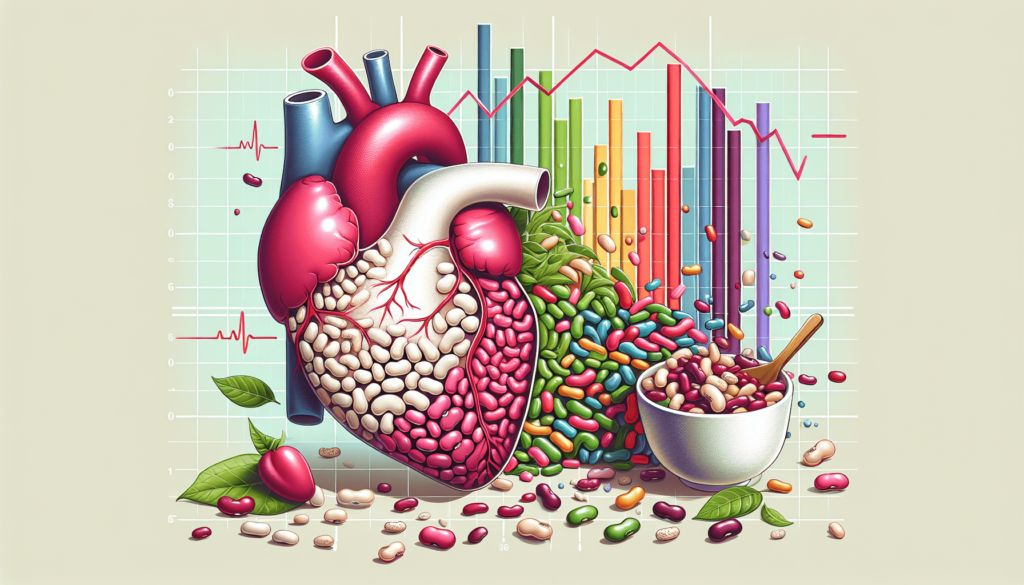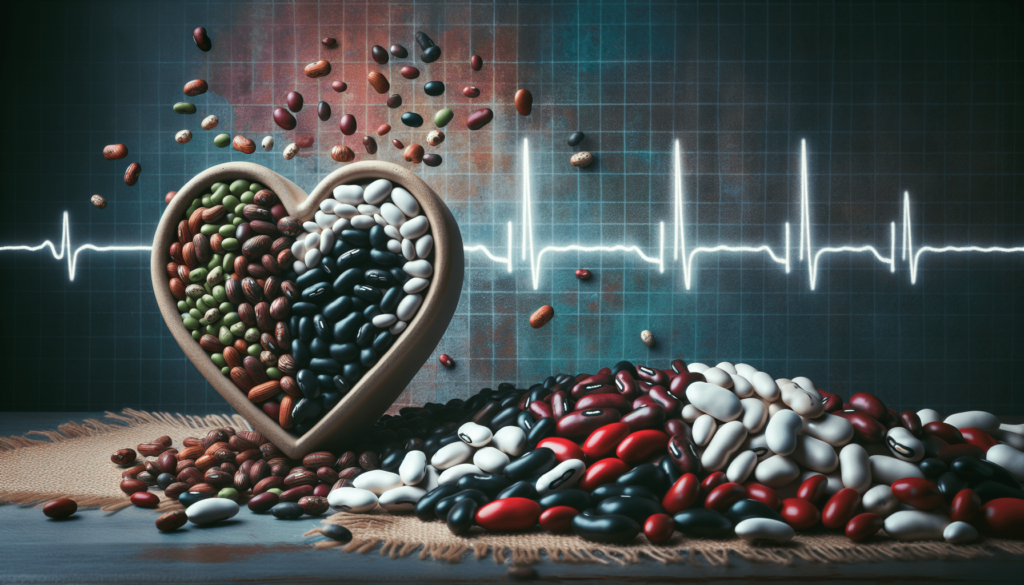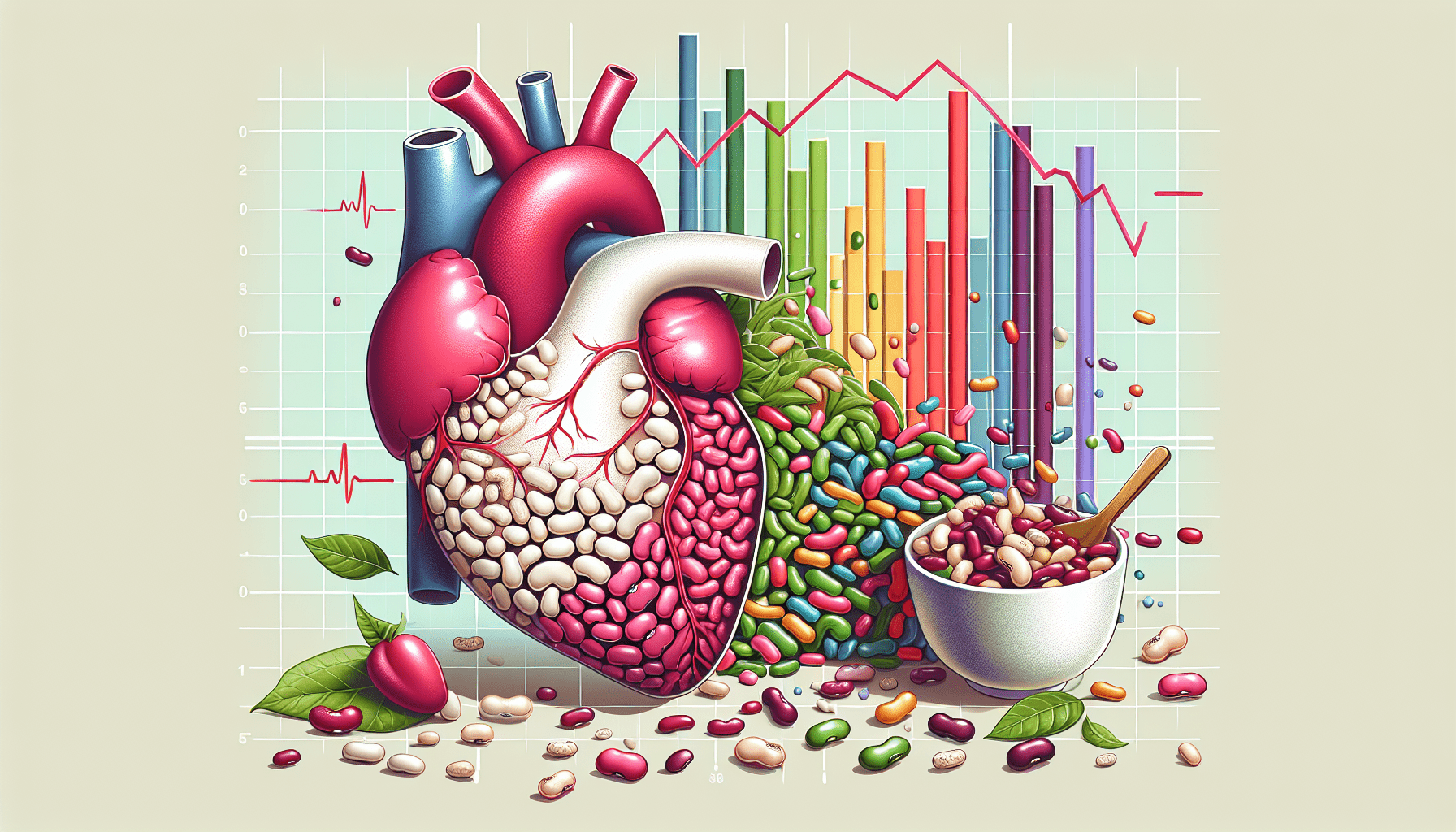You’ve probably heard that consuming a healthy diet can lower your risk of developing cardiovascular diseases. But did you know that a simple addition to your meals, like beans, can make a significant difference? Recent studies have shown that incorporating beans into your diet can help reduce the risk of cardiovascular diseases. Packed with fiber, protein, and antioxidants, beans offer multiple benefits for your heart health. So, the next time you’re planning your meals, why not consider adding a delicious bean dish to protect your heart and enjoy a heart-healthy lifestyle?

Overview of cardiovascular diseases
Definition of cardiovascular diseases
Cardiovascular diseases, also known as heart diseases, refer to a group of conditions that affect the heart and blood vessels. These conditions include coronary artery disease, heart failure, arrhythmias, valvular heart diseases, and stroke. They are collectively the leading cause of death worldwide, accounting for millions of deaths each year.
Prevalence of cardiovascular diseases
Cardiovascular diseases are highly prevalent, affecting people of all ages and backgrounds. According to the World Health Organization (WHO), around 17.9 million people die from cardiovascular diseases every year, representing approximately 31% of all global deaths. The burden of these diseases is not limited to high-income countries, as they are increasingly becoming a major concern for low- and middle-income nations.
Risk factors for cardiovascular diseases
Various risk factors contribute to the development of cardiovascular diseases. These can be divided into modifiable and non-modifiable factors. Non-modifiable risk factors include age, gender, and family history of cardiovascular diseases. On the other hand, modifiable risk factors such as high blood pressure, high cholesterol levels, smoking, unhealthy diet, physical inactivity, obesity, and diabetes can be targeted through prevention strategies.
Importance of preventing cardiovascular diseases
Impact of cardiovascular diseases on health
Cardiovascular diseases can have a profound impact on an individual’s health and well-being. They can lead to various complications, including heart attacks, heart failure, stroke, and even death. These conditions often result in a reduced quality of life, physical limitations, and a need for long-term medical care. By preventing the onset of cardiovascular diseases, individuals can maintain optimal health and avoid the potential adverse consequences associated with these conditions.
Economic burden of cardiovascular diseases
In addition to the detrimental health effects, cardiovascular diseases impose a significant economic burden on individuals, families, and society as a whole. The cost of treating cardiovascular diseases, including hospitalizations, medications, and rehabilitation, is substantial. Furthermore, the indirect costs resulting from loss of productivity and the impact on caregivers and the healthcare system place a heavy financial strain. Therefore, the prevention of cardiovascular diseases can lead to substantial cost savings and alleviate the economic burden on both individuals and society.
Nutritional benefits of beans
Nutritional composition of beans
Beans are a nutrient-rich food, packed with various essential nutrients. They are an excellent source of plant-based protein, providing a healthy alternative to animal-derived protein sources. Beans are also high in dietary fiber, complex carbohydrates, vitamins, and minerals. Additionally, they are low in fat and contain no cholesterol. The combination of these nutrients makes beans a highly nutritious food choice, contributing to overall health and well-being.
Role of beans in a balanced diet
Beans play a crucial role in a balanced diet due to their nutritional composition. They provide essential nutrients such as protein, fiber, vitamins, and minerals while being low in saturated fat and cholesterol. Incorporating beans into a balanced diet can help meet daily nutrient requirements, promote satiety, and contribute to weight management. Furthermore, the high fiber content in beans can aid in digestion, regulate blood sugar levels, and support a healthy gut microbiome.

Link between beans consumption and cardiovascular health
Research studies on the relationship between beans consumption and cardiovascular diseases
Numerous research studies have explored the potential relationship between beans consumption and cardiovascular health. These studies have consistently shown promising results, indicating that regularly including beans in the diet may help reduce the risk of cardiovascular diseases. The positive outcomes observed in these studies have paved the way for further investigation into the mechanisms by which beans exert their protective effects.
Mechanisms by which beans may reduce the risk of cardiovascular diseases
Beans contain bioactive compounds, such as polyphenols, flavonoids, and phytosterols, which have been associated with cardiovascular health benefits. These compounds possess anti-inflammatory and antioxidant properties, which can protect against the development and progression of cardiovascular diseases. Furthermore, the high fiber content in beans has been shown to lower cholesterol levels, improve blood pressure control, and enhance insulin sensitivity, all of which contribute to a reduced risk of cardiovascular diseases.
Fiber content in beans and its effect on cardiovascular health
Role of dietary fiber in cardiovascular health
Dietary fiber plays a vital role in cardiovascular health. Soluble fibers, specifically, have been extensively studied for their cholesterol-lowering effects. When consumed, soluble fiber forms a gel-like substance in the digestive tract, which binds to cholesterol and prevents its absorption into the bloodstream. By reducing cholesterol levels, dietary fiber can help prevent the accumulation of plaque in the arteries, promoting healthy blood flow and reducing the risk of cardiovascular diseases.
Fiber content in different types of beans
Different types of beans vary in their fiber content. For instance, black beans contain approximately 15 grams of fiber per cup, while kidney beans have around 16 grams of fiber per cup. Chickpeas, commonly used in hummus and Mediterranean cuisine, provide approximately 12 grams of fiber per cup. These high fiber contents make beans an excellent dietary choice for promoting cardiovascular health and maintaining healthy cholesterol levels.
Impact of beans on cholesterol levels
Effect of beans consumption on total cholesterol levels
Multiple studies have demonstrated that incorporating beans into the diet can help lower total cholesterol levels. The high fiber content in beans, particularly soluble fiber, plays a crucial role in this effect. Soluble fiber binds to bile acids in the intestine, which are composed of cholesterol, and facilitates their excretion from the body. As a result, the liver produces more bile acids from circulating cholesterol, leading to a reduction in overall cholesterol levels.
Effect of beans consumption on LDL cholesterol levels
Low-density lipoprotein (LDL) cholesterol, often referred to as “bad” cholesterol, is a major contributor to the development of cardiovascular diseases. Research has indicated that beans consumption, particularly those high in soluble fiber, can help decrease LDL cholesterol levels. By binding to bile acids and interfering with their reabsorption, soluble fiber in beans promotes the excretion of cholesterol and reduces its circulating levels, contributing to a healthier lipid profile.
Effect of beans consumption on HDL cholesterol levels
High-density lipoprotein (HDL) cholesterol, commonly known as “good” cholesterol, is beneficial for cardiovascular health as it helps remove excess cholesterol from the bloodstream. Studies have shown that consuming beans can increase HDL cholesterol levels, thus improving the overall lipid profile. While the exact mechanisms underlying this effect are not fully understood, the high fiber and bioactive compound content in beans may play a role in promoting HDL cholesterol synthesis and function.
Other beneficial components of beans for cardiovascular health
Phytochemicals in beans and their cardiovascular benefits
Beans are rich in phytochemicals, such as flavonoids, phenolic acids, and tannins, which have been associated with cardiovascular benefits. These compounds possess antioxidant and anti-inflammatory properties, reducing oxidative stress and inflammation in the cardiovascular system. Additionally, certain phytochemicals in beans have been shown to enhance blood vessel function, improve blood pressure regulation, and inhibit platelet aggregation, thereby reducing the risk of cardiovascular diseases.
Minerals and antioxidants in beans and their cardiovascular benefits
Beans are a good source of various minerals, including potassium, magnesium, and calcium, all of which are essential for maintaining heart health. These minerals play a crucial role in regulating blood pressure, heart rhythm, and muscle function. Additionally, beans contain antioxidants, such as vitamin C and E, which help protect against oxidative damage to the cardiovascular system. The combination of minerals and antioxidants in beans contributes to their overall cardiovascular benefits.
Comparison of different types of beans in reducing cardiovascular risk
Nutritional profile and cardiovascular benefits of black beans
Black beans are known for their deep color and rich flavor. They are an excellent source of dietary fiber, protein, and antioxidants. Black beans also contain folate, potassium, and magnesium, which are important minerals for cardiovascular health. The combination of these nutrients makes black beans an effective food choice for reducing the risk of cardiovascular diseases and maintaining heart health.
Nutritional profile and cardiovascular benefits of kidney beans
Kidney beans, named for their resemblance to the shape and color of a kidney, are packed with essential nutrients. They provide a significant amount of dietary fiber, protein, and folate. Kidney beans are also rich in antioxidants, particularly anthocyanins, which are responsible for their vibrant red color. The high fiber and antioxidant content in kidney beans make them a valuable addition to a heart-healthy diet.
Nutritional profile and cardiovascular benefits of chickpeas
Chickpeas, also known as garbanzo beans, are a versatile legume commonly used in various cuisines around the world. They are an excellent source of fiber, protein, and minerals such as potassium and magnesium. Chickpeas are also packed with antioxidants, including flavonoids and phenolic acids, which contribute to their cardiovascular benefits. Adding chickpeas to meals can promote heart health and reduce the risk of cardiovascular diseases.
Incorporating beans into a heart-healthy diet
Suggested serving sizes of beans
To reap the cardiovascular benefits of beans, it is recommended to include them in your meals regularly. The American Heart Association suggests consuming at least three servings of legumes, including beans, per week. A serving size of cooked beans is typically around ½ to ¾ cup. However, individual dietary needs may vary, so it is essential to consult with a healthcare professional or registered dietitian for personalized recommendations.
Tips for preparing and cooking beans
When preparing and cooking beans, there are several steps you can follow to enhance their taste, texture, and digestibility. It is recommended to soak dried beans overnight before cooking, as this reduces cooking time and helps eliminate compounds that can cause digestive discomfort. Additionally, rinsing canned beans under cold water can further reduce sodium content. Experimenting with different cooking techniques, such as pressure cooking or slow cooking, can also add variety to your bean dishes.
Recipes and meal ideas with beans
Incorporating beans into your diet can be an enjoyable and delicious experience. There are countless recipes and meal ideas that feature beans as the main ingredient or as a complementary component. From hearty soups and stews to satisfying salads and casseroles, beans can be used in a variety of dishes. Additionally, blending beans into dips, spreads, or even baking them into desserts can provide a creative and nutritious twist to your meals.
Conclusion
Summary of the potential benefits of beans for reducing the risk of cardiovascular diseases
Beans offer various nutritional benefits that contribute to a reduced risk of cardiovascular diseases. The high fiber content in beans helps lower cholesterol levels and supports healthy blood pressure regulation. Additionally, the presence of bioactive compounds, minerals, and antioxidants in beans further promotes cardiovascular health. Regular consumption of beans, alongside a balanced diet and a healthy lifestyle, can play a significant role in preventing and managing cardiovascular diseases.
Importance of including beans in a balanced and varied diet
Incorporating beans into a balanced and varied diet is crucial for overall health and well-being, particularly in terms of cardiovascular health. Beans provide essential nutrients, including protein, fiber, vitamins, and minerals, while being low in saturated fat and cholesterol. Their versatility and availability make them an accessible and affordable option for individuals of all ages and dietary preferences. By including beans as a regular part of your meals, you can support heart health and enjoy the numerous benefits they offer.

